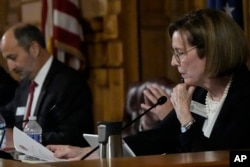
The election board for the U.S. state of Georgia on Friday voted to approve a new rule that requires poll workers to count the number of paper ballots by hand after voting is completed, a change that critics worry could delay the reporting of election night results.
The board's decision went against the advice of the state attorney general's office, the secretary of state's office and an association of county election officials. Three Republican board members who were praised by former President Donald Trump during a rally last month in Atlanta voted to approve the measure, while the lone Democrat on the board and the nonpartisan chair voted to reject it.
The State Election Board has found itself mired in controversy in recent months as it considers new rules, many of them proposed by Trump allies. Democrats, legal experts and democracy advocates have raised concerns that new rules could be used by the former president and his supporters to cause chaos in this crucial swing state and undermine public confidence in results if he loses to Democratic Vice President Kamala Harris in November.
In a memo sent to election board members Thursday, the office of state Attorney General Chris Carr said no provision in state law allows hand counting of ballots at precincts. The memo says the rule is "not tethered to any statute" and is "likely the precise kind of impermissible legislation that agencies cannot do." It warns that any rule that oversteps the board's authority is unlikely to survive a legal challenge.
Already, two rules the board passed last month having to do with certifying vote counts have been challenged in two separate lawsuits, one filed by Democrats and the other filed by a conservative group. A judge has set an October 1 trial on the Democrats' lawsuit.
Secretary of State Brad Raffensperger last month called the hand counting rule "misguided," saying it would delay the reporting of election results and introduce risks to chain of custody procedures.
The new rule requires that the number of ballots — not the number of votes — be counted at each polling place by three separate poll workers until all three counts are the same. If a scanner has more than 750 ballots inside at the end of voting, the poll manager can decide to begin the count the following day.
Georgia voters make selections on a touchscreen voting machine that prints out a paper ballot that includes a human-readable list of the voter's choices as well as a QR code that is read by a scanner to tally the votes.
Proponents say the rule is needed to make sure the number of paper ballots matches the electronic tallies on scanners, check-in computers and voting machines. The three workers will have to count the ballots in piles of 50, and the poll manager needs to explain and fix, if possible, any discrepancies, as well as document them.
Results could be delayed if polling places decide to wait until the hand tally is finished before they send the memory cards that record the votes in machines to the central tabulation location.
Several county election officials who spoke out against the rule during a public comment period preceding the vote warned that a hand count could delay the reporting of election night results. They also worried about putting an additional burden on poll workers who have already worked a long day.
Leaders of the Georgia Association of Voter Registration and Election Officials raised concerns similar to Raffensperger's in a letter to the State Election Board last month, warning the rule would ultimately undermine confidence in the process. The nonprofit association's members include over 500 election officials and workers statewide, according to the organization.
Janelle King, a board member who worked with the author of the rule on the wording, said she wasn't concerned if election night reporting was slowed a bit in favor of making sure that the number of ballots is accurate.
"What I don't want to do is set a precedent that we're OK with speed over accuracy," she said as the board was discussing the rule proposal, adding that she'd rather wait an extra hour or so for results than hear about lawsuits over inaccurate counts later.
Board chairman John Fervier cautioned that the board was going against the advice of its lawyers and could be exceeding its authority.
"This board is an administrative body. It's not a legislative body," he said. "If the legislature had wanted this, they would have put it in statute."
Some other states already count ballots by hand at the end of voting. Illinois has done so for decades "without complaints of delays or any potential impact on ballot security," Matt Dietrich, a spokesperson for the Illinois State Board of Elections, said in a statement. "It's designed to ensure integrity and voter trust and by all accounts has worked."
Guidelines from the U.S. Election Assistance Commission say "the total number of ballots cast should balance with the number of total voters processed at each polling place," but they do not call for a hand count of ballots from a tabulator.
The board also tabled until 2025 a proposal for a similar count at early in-person voting locations. The board considered 11 new rules Friday, adopting a few others that mostly make minor changes and tabling some more complicated ones.
The election officials association had urged the State Election Board in a letter Tuesday not to consider any new rules when Election Day is less than 50 days away, ballots are already going out and poll worker training is well underway.
"We do not oppose rules because we are lazy or because a political operative or organization wants us to," the letter says. "We oppose rules because they are poorly written, inefficient, would not accomplish their stated goals, or go directly against state law."


























